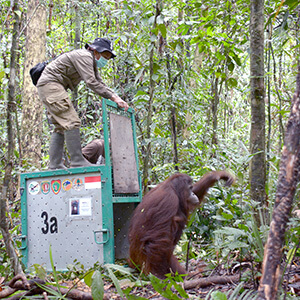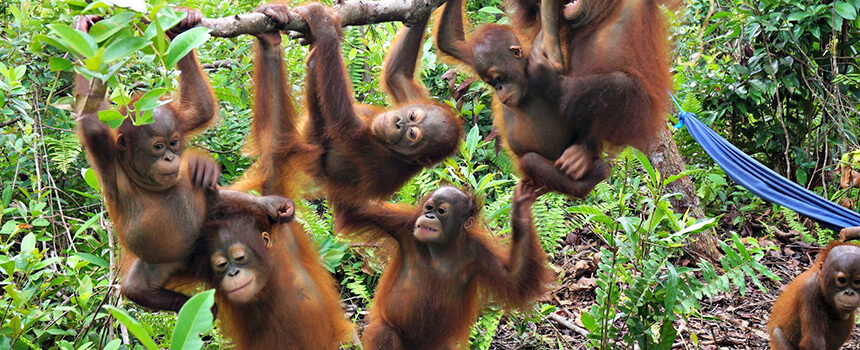 Born to be wild!
Born to be wild!
Reintroducing Borneo orangutans into the wild
Orangutan is Indonesian for ‘person of the forest’. Legend has it that these were particularly clever humans who retreated to the forest in order not to have to work. These ‘thinkers of the jungle’ are the only great apes in Asia and have 96.5 per cent of their DNA in common with humans. In 2016, the Borneo orangutan was upgraded on the World Conservation Union (IUCN) red list to being ‘critically endangered’. According to a study (Ancrenaz et al. 2016), based on 1950s numbers, about 82 per cent of the Borneo orangutans will have disappeared by 2025.
Necessity
Health checks, genetic tests, medicine, tranquilisers and food for reintroducing orangutans on Borneo.
Activity
Veterinarians and animal keepers of the BOS Foundation take care of orangutans before and during their reintroduction into the wild.
Countable effort
Number of orangutans that can be successfully reintroduced to the rain forest.
Result
In protected rain forest the orangutans can live in freedom, find mates and keep their species alive.
Systemic effect
Conservation of the orangutan in protected areas on Borneo.
Background
Borneo orangutans have no natural predators – other than humans. Every day, large swaths of rain forest disappear to make way for oil palm plantations. Every second product sold in a supermarket includes palm oil: in foods, cosmetics, cleaning products. In their desperate search for food, the orangutans invade the plantations or go to near villages: Often with deadly consequences.
A second reason for the extinction of the orangutans is the illegal pet trade. Many are sold on the black market to be kept as pets.
Injured and orphaned orangutans end up at the rescue station of Borneo Orangutan Survival (BOS), where they are rehabilitated in forest nurseries and schools. About 700 animals are currently living with BOS. Their goal: Introducing them back into the wild in safe areas of rain forest.
The good deed
We want to reintroduce as many orangutans back into protected forests as possible. That is the only way to ensure their survival as a species. Reintroduction is carried out under strict veterinary supervision. BOS tries to limit as much as possible the amount of stress that the animals are exposed to during transport, so that they can have a healthy start to their new life. At our rescue station Nyaru Menteng, about 300 orangutans are awaiting reintroduction. The good deed is providing them with the necessary health checks, genetic tests, medicine, tranquilisers and food that they need to be reintroduced. They then can finally get on with their new life as a wild orangutan.

AboutIndonesia
Jakarta
Capital
261 115 500
Number of inhabitants
3 604
Gross domestic product per capita per year
113
Human Development Index
Indonesia is the largest island nation and the country in the world with the fourth largest population.
About the organization and further information
Association
BOS Deutschland e.V. - Borneo Orangutan Survival Deutschland
Transparency International
Further information and source
- http://www.iucnredlist.org/details/17975/0
- Pirker, J., A. Mosnier, F. Kraxner, P. Havlík, and M. Obersteiner. 2016. “What Are the Limits to Oil Palm Expansion?” Global Environmental Change 40.
- White, A., A. Lanjouw, und H. Rainer. 2015. Industrial Agriculture and Ape Conservation. Cambridge University Press.
- http://wwf.panda.org/what_we_do/where_we_work/borneo_forests/borneo_deforestation/




